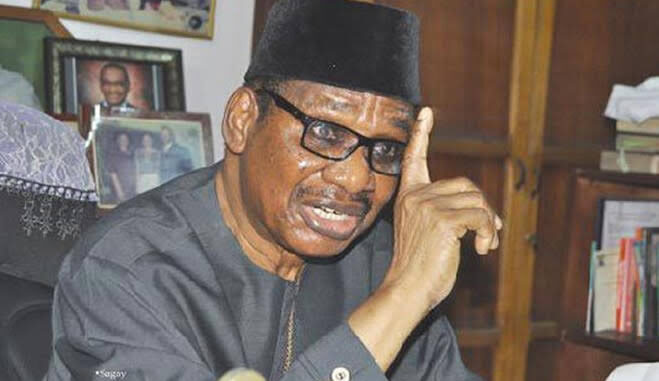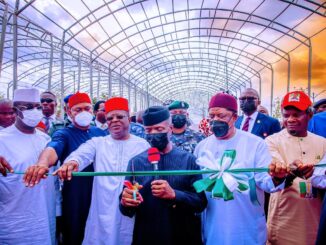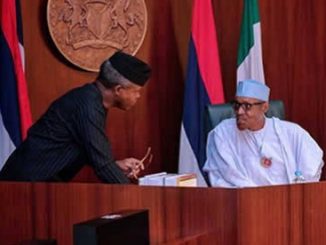
One of Nigeria’s most respected legal luminaries, Prof. Itse Sagay advocated the need for judicial reforms, analysed some of the decisions made by the Bola Tinubu administration, and how they have impacted the citizens. Also, Hajia Halima Ibrahim, National Coordinator (Financing) of the Safe Schools Project, detailed how technology would be used to improve security, especially for schoolchildren.
But let’s start with the host Laolu Akande’s “My Take” which is at the beginning of the programme:
1. Akande, in his intro ‘My Take’ urged the Tinubu government to tackle the galloping inflation that has made life difficult for citizens. “The president is going to get the blame or the praise for what is happening. This is happening under his watch. Now, I can say, you know, because of what I experienced, that a lot of the problems that we are dealing with today, have been on for a long time. “There are people that understand the problem even more than the average guy. I think that the president should reach out wider. His party, the APC, has been in government for eight years. There are people who have been working on this problem for eight years.” he said.
2. Prof. Itse Sagay
Timing of subsidy removal:
Professor Itse Sagay suggests that President Bola Tinubu’s decision to remove the subsidy on Premium Motor Spirit (PMS) immediately after his inauguration in May 2023 was premature. Sagay believes that Tinubu should have waited for at least six months after assuming office before implementing such a significant policy change. This highlights the importance of timing and gradual transition in policy implementation to mitigate adverse effects on the populace.
3. Impact on cost of living:
Sagay emphasizes the negative impact of the sudden subsidy removal on the cost of living in Nigeria. He notes that the abrupt decision has led to untold hardship for the citizens, making basic necessities more expensive and affecting the overall standard of living. This underscores the need for policymakers to consider the socio-economic implications of their decisions and implement measures to cushion the impact on vulnerable populations.
4. Judicial reform:
Professor Itse Sagay criticized the prevailing trend in the Nigerian judiciary where appointments are perceived to be influenced by nepotism and favouritism. He highlighted concerns about “inbreeding” within the judiciary, particularly at higher levels, where relatives of existing judges tend to be appointed. He underscored the need for transparency and meritocracy in the appointment process to ensure the judiciary’s integrity and independence. Sagay reminisced on the “golden age” of the Supreme Court and the eminent justices like Kayode Esho and Oputa, who epitomized a judicial philosophy focused on achieving justice rather than rigid adherence to technicalities of the law. He advocated for a return to this approach, emphasizing the importance of prioritizing justice over legal formalism.
ALSO READ: Time for state police is now — Laolu Akande
5. Importance of local production:
The former Chairman of the Presidential Advisory Committee Against Corruption advocates for the prioritization of internal production before subsidy removal. Sagay suggests that waiting for domestic petrol production to commence would have eased the transition and minimized the hardships experienced by Nigerians. This highlights the significance of promoting local industries and reducing dependence on imported goods to achieve sustainable economic growth.
6. Concerns about naira depreciation:
Sagay expresses alarm over the depreciation of the Nigerian naira, particularly against the US dollar. He warns that the continued deterioration of the currency’s value could undermine the government’s efforts and have detrimental effects on the economy. This underscores the importance of implementing measures to stabilize the currency and restore investor confidence to safeguard economic stability and growth.
7. Confidence in the new government’s leadership:
Despite his critiques, Sagay expresses confidence in the ability of the new government to provide quality leadership and address the challenges facing Nigeria. He believes that the administration is composed of competent individuals who understand the issues and are capable of steering the country towards a better future. This reflects optimism in the government’s capacity to navigate the current difficulties and improve the welfare of the Nigerian people over time.
Hajia Halima Ibrahim, National Coordinator (Financing) of the Safe Schools Project
8. Introduction of electronic ID Cards for schoolchildren:
The Federal Government is planning to introduce electronic identity cards with chip card technology in schools as a measure to address the rising incidents of schoolchildren abduction in Nigeria. This initiative aims to provide a means for schoolchildren in danger to alert the Safe School Response Center, which will be established at the Nigeria Security and Civil Defence Corps (NSCDC) office in Abuja. The implementation of these digital ID cards is seen as a proactive step to enhance the security and safety of students across the country.
9. Innovation and technology utilization:
The implementation of chip technology in school ID cards demonstrates an innovative use of technology to enhance security measures in educational institutions. By incorporating a digital alert system into the ID cards, students will have a direct means of signalling security agents in case of emergencies or threats. This reflects the adaptation of digital solutions to address contemporary security challenges, particularly in the context of protecting vulnerable populations such as schoolchildren.
10. Government commitment and budget allocation:
The commitment of government authorities, particularly state governors, to prioritize the safety of schoolchildren is evident through budgetary allocations towards the implementation of the Safe Schools Plan. Governors of states like Benue, Plateau, Bauchi, and others have reportedly made commitments in their 2024 budgets to support this initiative. This underscores the recognition of the urgency and seriousness of the issue of schoolchildren abduction and the willingness of governments to allocate resources towards proactive measures to mitigate this threat.




